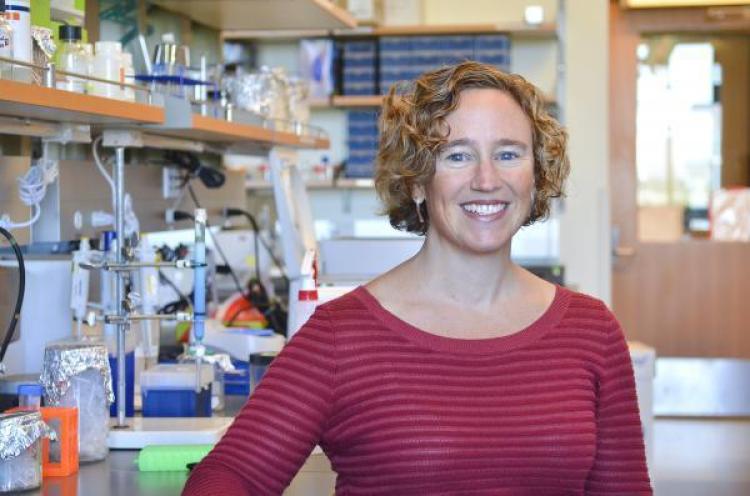CU Boulder scientists win $1.2M for cutting-edge microscopy center
New center will be ‘truly paradigm shifting for life scientists and engineers across campus’
Researchers at the University of Colorado Boulder have won a $1.2 million award to establish a Center for Light Sheet Microscopy and Data Science, the Arnold and Mabel Beckman Foundation has announced.
CU Boulder is one of eight institutions nationwide to win this support.
Amy Palmer, professor of biochemistry and the proposal’s lead principal investigator, recruited two co-PIs: Kristi Anseth, distinguished professor of chemical and biological engineering, and Joseph Dragavon, director of the Advanced Light Microscopy Core at the BioFrontiers Institute.
Palmer’s group will use the funds to build two light sheet microscopes and establish a center dedicated to education and training in data management, processing and analysis.

Amy Palmer
Light sheet microscopes use a plane of light to illuminate biological specimens. Palmer said the group will build an adaptive multi-view light sheet for live animal specimens and 3D organoids and a separate microscope for high-resolution imaging of live cells.
As the Beckman Foundation notes, light sheet microscopy is a cutting-edge technology that “enables rapid three-dimensional analysis of single molecules, living cells, organs and even whole animals with minimal toxicity.”
As such, the technology could be “truly paradigm shifting for life scientists and engineers across campus,” Palmer said. But one challenge of light sheet microscopy is that it generates massive amounts of data.
The foundation is eager to support advanced light-sheet initiatives at these institutions and increase access to these emerging instruments to scientists at a range of career stages."
“So we need to integrate the concept of data science and management from the outset, at the time of experimental design,” Palmer added.
For the data-science team, the group recruited two computer scientists: Assistant Professor Orit Peleg and Associate Professor Qin (Christine) Lv from the College of Engineering and Applied Science.
To help train students, postdoctoral fellows, faculty and other researchers, the group plans to develop a series of educational workshops on topics ranging from quantitative optical microscopy, light sheet microscopy, data management and visualization, machine learning, and analysis of light sheet data.
Palmer said the new center will facilitate an “incredible array of research projects that tackle fundamental scientific questions.”
Those questions span the cellular level (e.g., how do dynamics of individual RNA molecules influence biochemical functions?), multi-cellular assemblies (e.g., how can the environment outside of cells be used during organoid development?), developmental biology (e.g., what regulates the formation of the nervous system in mammalian development?), and neuroscience (e.g., where do specific populations of neurons project in cleared rodent brains?).
Once built, the microscopes will become part of the BioFrontiers Advanced Imaging Core in the Jenny Smoly Caruthers Biotechnology Building and will be widely available to researchers across campus.
In addition to CU Boulder, the other winning research teams include Rockefeller University, the University of Rochester, Washington University in St. Louis, Reed College and Smith College, plus research institutes at Marine Biological Laboratory and Morgridge Institute for Research.
“The foundation is eager to support advanced light-sheet initiatives at these institutions and increase access to these emerging instruments to scientists at a range of career stages,” said Anne Hultgren, executive director of the Arnold and Mabel Beckman Foundation.
The foundation supports researchers and nonprofit research institutions in making the next generation of breakthroughs in chemistry and the life sciences. It aims to support U.S. institutions and young scientists whose “creative, high-risk and interdisciplinary research will lead to innovations and new tools and methods for scientific discovery.”

